-
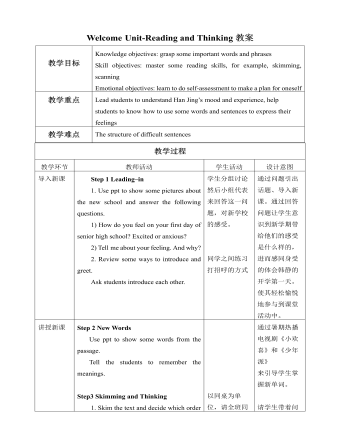
新人教版高中英语必修1Welcome Unit-Reading and Thinking教案
Step 2 New WordsUse ppt to show some words from the passage.Tell the students to remember the meanings.Step3 Skimming and Thinking1. Skim the text and decide which order Han Jing follows to talk about her first day. Time order or place order?Time order2. What is Han Jing worried about before she goes to senior high school?She is worried about whether she will make new friends and if no one talks to her, what she should do.Step 4 Fast Reading1. Match the main ideas with each paragraphParagraph 1:The worries about the new school day Paragraph 2Han Jing’s first maths classParagraph 3Han Jing’s first chemistry classParagraph 4Han Jing’s feelings about her first senior school dayStep 5 Careful Reading1. Fill in the chart with the words and phrases about Han Jing’s day. Answers: Senior high school, a little nervous; Her first maths class, classmates and teachers, friendly and helpful; Chemistry lab; new; great; annoying guy; Confident; a lot to explore2. Read the text again and discuss the questions.1) Why did Han Jing feel anxious before school?Because she was a new senior high student and she was not outgoing. What was more, she was worried about whether she can make friends.2) How was her first maths class?It was difficult but the teacher was kind and friendly. 3) What happened in the chemistry class? What would you do if this happened to you? A guy next to Han Jing tried to talk with her and she couldn’t concentrate on the experiment.
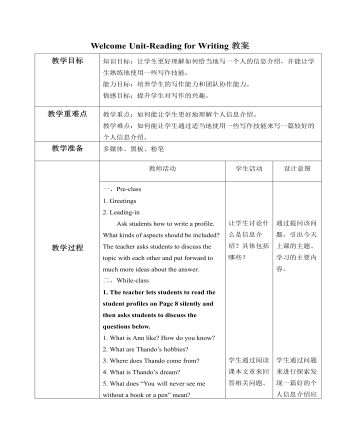
新人教版高中英语必修1Welcome Unit-Reading for Writing教案
教学目标知识目标:让学生更好理解如何恰当地写一个人的信息介绍,并能让学生熟练地使用一些写作技能。能力目标:培养学生的写作能力和团队协作能力。情感目标:提升学生对写作的兴趣。教学重难点 教学重点:如何能让学生更好地理解个人信息介绍。教学难点:如何能让学生通过适当地使用一些写作技能来写一篇较好的个人信息介绍。教学准备 多媒体、黑板、粉笔一、Pre-class1. Greetings2. Leading-inAsk students how to write a profile. What kinds of aspects should be included? The teacher asks students to discuss the topic with each other and put forward to much more ideas about the answer.二、While-class1. The teacher lets students to read the student profiles on Page 8 silently and then asks students to discuss the questions below.1. What is Ann like? How do you know?2. What are Thando’s hobbies?3. Where does Thando come from?4. What is Thando’s dream?5. What does “You will never see me without a book or a pen” mean?

新人教版高中英语必修2Unit 1 Cultural Heritage-Discovering Useful Structure教案一
This teaching period mainly deals with grammar “restrictive relative clauses.” To begin with, teachers should lead students to revise what they have learned about the relative pronouns and relative adverbs. And then, teachers move on to stress more special cases concerning this grammar, such as the “preposition+ relative pronouns which and whom” and cases where we can omit the relative pronouns. This period carries considerable significance to the cultivation of students’ writing competence and lays a solid foundation for the basic appreciation of language beauty. The teacher is expected to enable students to master this period thoroughly and consolidate the knowledge by doing some exercises. 1. Guide students to review the basic usages of relative pronouns and adverbs of attributive clauses.2. Lead students to learn to use some special cases concerning restrictive relative clauses flexibly.2. Enable students to use the basic phrases structures flexibly.3. Strengthen students’ great interest in grammar learning.1. Help students to appreciate the function of relative pronouns and adverbs of attributive clauses in a sentence2. Instruct students to write essays using the proper relative pronouns and adverbs of attributive clauses.本节语法思考:定语从句在复合句中的作用是什么? 关系词有哪些?定语从句在复合句中的作用相当于形容词,它在句中作定语修饰名词或代词。他们在先行词和定语从句之间起到联系作用,同时在意义上代表先行词并在定语从句中担任一个成分。被定语从句所修饰的词称先行词,定语从句一般放在先行词的后面。

新人教版高中英语必修2Unit 1 Cultural Heritage-Listening&Speaking&Talking教案
Listening and Speaking introduces the topic of “Take part in a youth project”. The listening text is an interview about an international youth cultural heritage protection project. More than 20 high school students from seven countries participated in the project. The reporter interviewed two participants Stephanie and Liu Bin. By listening to the text, students can understand the significance of cultural heritage protection, and teenagers can use their knowledge, combine their own interests and advantages, etc. to participate in the action of cultural heritage protection. Listening and Talking introduces the theme of "Talk about history and culture". The listening text is a dialogue between two tourists and tour guides when they visit the Kremlin, red square and surrounding buildings. The dialogue focuses on the functional items of "starting a conversation", which is used to politely and appropriately attract the attention of the others, so as to smoothly start a conversation or start a new topic. The purpose of this section is to guide students to understand the history and current situation of Chinese and foreign cultural heritage in their own tourism experiences or from other people's tourism experiences, explore the historical and cultural values, and be able to express accurately and appropriately in oral communication.1. Guide students to understand the content of listening texts in terms of the whole and key details; 2. Cultivate students' ability to guess the meaning of words in listening; discuss with their peers how to participate in cultural heritage protection activities.3. Instruct students to use functional sentences of the dialogue such as “I beg your pardon, but…” “Forgive me for asking, but…" and so on to start the conversation more politely and appropriately.
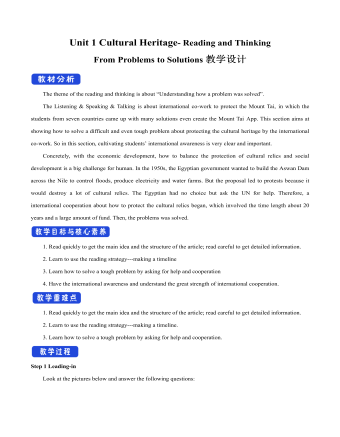
新人教版高中英语必修2Unit 1 Cultural Heritage-Reading and Thinking教案一
The theme of the reading and thinking is about “Understanding how a problem was solved”.The Listening & Speaking & Talking is about international co-work to protect the Mount Tai, in which the students from seven countries came up with many solutions even create the Mount Tai App. This section aims at showing how to solve a difficult and even tough problem about protecting the cultural heritage by the international co-work. So in this section, cultivating students’ international awareness is very clear and important. Concretely, with the economic development, how to balance the protection of cultural relics and social development is a big challenge for human. In the 1950s, the Egyptian government wanted to build the Aswan Dam across the Nile to control floods, produce electricity and water farms. But the proposal led to protests because it would destroy a lot of cultural relics. The Egyptian had no choice but ask the UN for help. Therefore, a international cooperation about how to protect the cultural relics began, which involved the time length about 20 years and a large amount of fund. Then, the problems was solved. 1. Read quickly to get the main idea and the structure of the article; read careful to get detailed information.2. Learn to use the reading strategy---making a timeline3. Learn how to solve a tough problem by asking for help and cooperation4. Have the international awareness and understand the great strength of international cooperation.1. Read quickly to get the main idea and the structure of the article; read careful to get detailed information.2. Learn to use the reading strategy---making a timeline.3. Learn how to solve a tough problem by asking for help and cooperation.

新人教版高中英语必修2Unit 2 Wildlife Protection-Reading and Thinking教案一
The listening and speaking part aims at how to protect and help endangered animals by listening, speaking and talking about the facts and reasons. This lesson analyzes the decreasing clause of Tibetan antelope population and the measures of protecting Tibetan antelopes. So students can be guided to learn to analyse the title and use different reading skills or strategies, like scanning, skimming and careful reading.1. Read quickly to get the main ideas and the purpose of going to Tibetan; read carefully to understand what the author see and think.2. Understand the sentences of the present continuous passive voice such as “Much is being done to protect wildlife.” and the inverted sentence “Only when we learn to exist in harmony with nature can we stop being a threat to wildlife and to our planet.”3. Enhance the awareness of protecting wildlife.4. Cultivate the reading methods according to different materials.1. Read quickly to get the main ideas and the purpose of going to Tibetan; read carefully to understand what the author see and think.2. Understand the sentences of the present continuous passive voice such as “Much is being done to protect wildlife.” and the inverted sentence “Only when we learn to exist in harmony with nature can we stop being a threat to wildlife and to our planet.”3. Cultivate the reading methods according to different materials.Step 1 Leading-inWatch a video about elephants and whales and then ask:Why are they endangered ? They are killed/hunted

新人教版高中英语必修2Unit 3 The Internet-Listening &Speaking&Talking教案一
Listening and Speaking introduces the topic of “ask about online habits”. Many middle school students have been surfing the Internet for many years, but what they do with the Internet and how much time they spend every day may not be very clear to themselves, nor to other students. This section allows students to investigate their peers' Internet use, which is conducive to their mutual understanding and understanding of the Internet. It can also help them reflect on their own online behavior, learn from other people's good online habits, and get rid of their bad online behavior.The listening text of this section is an investigation interview. The investigators interview specific groups with the same questions to obtain information, so as to understand their views, practices or attitudes on this issue. There are two specific questions: “how much time do you spend online every day? What do you usually do online?”. The answers of the three respondents provide rich and different information, and achieve the purpose of the investigators. The oral discourse structure of survey interviews generally includes greeting and explaining the purpose of the interview, presenting the interview questions and the respondents' answers. Listening and Talking introduces the theme of “choosing the right application ". Listening text is a conversation between Laura and Xiao Bo. In this part of listening, “oink”; “piggy bank” may cause the students' hearing comprehension limitation. Oink refers to sound word and pig's sound. So, add some oink to my piggy bank is often used to describe "making a little money".1. Guide students to understand the content of listening texts in terms of listening for definitions.2. Cultivate students' ability to define words and understand an investigation interview.

新人教版高中英语必修2Unit 3 The Internet-Reading and Thinking教案一
Paragraph 3. Jan decided to start an IT club to teach old people how to use computers and the Internet. Paragraph 4. Jan has started taking online classes to learn more about how to use the Internet to make society better. Paragraph 5. Jan’s life has been greatly improved by the Internet. Step 5: Critical thinking:(1)How do you arrange your time spent on study and the Internet? Is it reasonable? I usually surf the Internet using my mobile phone for only an hour after class, and it is reasonable for me.(2)What are your online activities? Are they safe? I chat with my friends, read news and play games. I never give away my private information so I think they are safe.Step 4: summary Much has been written about the wonders of the World Wide Web. There are countless articles (1)______(tell) us how the Internet has made our lives more convenient. But the Internet has done a lot (2)_____(much) for people than simply make life more convenient. People’s lives (3) _________________(change) by online communities and social networks so far. Take Jan for example, who developed a serious illness that made her (4)_____(stick) at home with only her computer to keep (5)___(she) company. She joined an online group (6)______ she could share problems, support and advice with others. She considered the ability to remove the distance between people as one of the greatest (7)_______(benefit). She was so inspired (8)____ she started an IT club in which many people have been helped. She has started to learn more about how to use the Internet to make society better. Her next goal is to start a charity website to raise money (9)___ children in poor countries. Jan’s life has been (10)______(great) improved by the Internet. Step 5 Homework:Review what we have learned and find out the key language points in the text.

新人教版高中英语必修2Unit 3 The Internet-Reading For Writing教案一
⑦identity theft 身份盗窃⑧chat room 聊天室⑨draft your blog post 起草博客帖子⑩post embarrassing photos 张贴尴尬照片 【话题句式】 1. How do you stay safe online and avoid bad experiences on the Internet? 你如何在网上保持安全, 避免在网上的不良经历? 2. I’m not an expert, but many years as a blogger have taught me a thing or two. 我不是专家, 但作为一个博主, 我已经学了好几年了。 3. If you see or read something that makes you feel uncomfortable, leave the site immediately. 如果你看到或读到一些让你觉得不舒服的东西, 立即离开这个网站。4. Don’t give out your address or phone number. 别告诉别人你的地址或电话号码。 5. Identity theft is a common and serious problem. 身份盗窃是一个常见而严重的问题。6. Being online is no excuse for being rude, and you don’t want to become a target for a troll or cyberbully. 上网并不是无礼的借口, 你也不想成为发挑衅帖子的人或网络恶霸的目标。 7. Trolls often use several false names so that they can stay on a site. 发挑衅帖子的人经常使用几个假名, 这样他们就可以留在一个网站上。8. However, the more polite you are, the less likely it is you will be attacked. 然而, 你越有礼貌, 你被攻击的可能性就越小。

新人教版高中英语必修2Unit 4 History and Traditions-Reading for Writing教案
Step 1 Lead inThere are many interest of places in the UK. What do you know ?The Big Ben the London Tower the Thames RiverStep 2 Before reading---analyze the titleBeautiful Ireland and its traditionWe know that the article mainly tells about the beauty and traditions of Ireland. Step 3 While reading---Task 1Read the text and answer the following questions.Q1: What makes the Irish countryside exciting and inspiring?Its beauty and how it offers something for all the scenes.Q2: What are the best ways to experience some Irish traditions and cultures?By stopping by a village pub and relaxing with a drink and traditional meal while listening to music and watching dancingQ3: What is the meaning of “breathe in the sweet scent of fresh flowers while birds greet the new day with their morning song ?”It means to not just smell but also breathe in the smell of fresh flowers early in the morning as the birds sing their first song of the new day.Q4: What are the best ways to experience Chinese traditions and customs ?By travelling to different places and using all your senses to experience everything and by interacting with local people.Step 4 While reading---Task 2Analyze the descriptive paragraph1. Identify and underline the paragraph’s introductory sentence and the ending sentence.Introductory sentence: Ireland’s beautiful countryside has always had a great influence on its people and traditions.Ending sentence: And if you introduce yourself to a friendly face, you are more than likely to experience local culture and customs first-hand.2. The paragraph talks about different senses in different places. Write the senses and places in the order that they appear.

新人教版高中英语必修2Unit 5 Music-Listening&Speaking&Talking教案
choir memberspeople to run food stands people to sell festival ticketspeople to sell music CDspeople to set up equipmentmusical performersStep 2: Listen to the announcement again and answer the questions. ? 1. What kind of songs will Grace Davis sing at the festival?? 2. Who can try out as a performer?? 3. What can those who think they do not have musical talent do?? 4. How can students volunteer to take part?? Talking about preferences:? Would you prefer doing ..?? What would you prefer to do?? Would you rather do .... or ….?? What would you rather do?? I'd prefer .... to ..? I'd rather have ... than .. Step 3: Speaking ProjectWork in groups. Role-play the conversation or make a new one.? Debbie: Where have you been? You missed the announcement about the music festival.? John: I was at the doctor's office. Music festival?? Frank: Yes, it's going to be next month on the school sports field. John, you can play the piano. How about playing it at the festival?? John: Well, I'd rather play the violin. I can play Liang Zhu.? Frank: Wow! Sounds good. What about you, Debbie? ? Debbie: Actually, I don't have much musical ability. I'd prefer just to help out with the crowds.? Frank: You can sell tickets or work at a food stand.? John: So can I assume that the aim of the festival is to raise money?? Debbie: Yes. All of the money will go to charity.

新人教版高中英语必修2Unit 5 Music-Listening and Speaking教案
This lesson is about music. Students can classify the types of music through the instruments and its sound and can talk about their preferences about music, even join some activities and play a role in them according to their musical talents. On the basis, they are guided to use the languages to express their preferences and some plosive sounds and their rules.1. Classify the music types through the instruments and its sound.2. Listen and understand what the speakers’ preferences are and the reasons; talk about their own preferences and give their own reasons, using these sentences: “What kind of music do you like? And why? “ “Because it makes/gives me energy/peaceful.../touches my heart...”.3. Learn some plosives and the rules.4. Join some activities and play a role in them according to the talents. 1. Listen and understand what the speakers’ preferences are and the reasons;2. talk about their own preferences and give their own reasons, using these sentences: “What kind of music do you like? And why? “ “Because it makes/gives me energy/peaceful.../touches my heart...”.3. Learn some plosives and incomplete plosives and its rules.Step 1 Lead inPoint at the pictures on P50 and ask Q1: What are the people doing in the pictures below?Q2: What kind of music they are?Then play the MP3s one by oneStep 2 ListeningTask 1: A reporter from the school newspaper is interviewing students about music. Listen to the interviews. Draw lines between the words to make complete sentences. Some words will not be used.
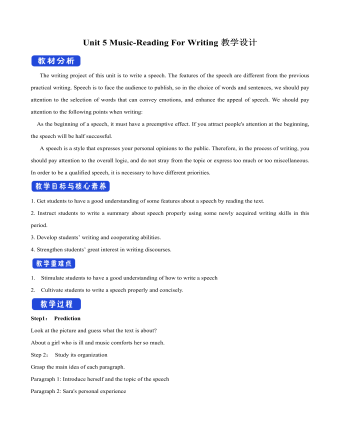
新人教版高中英语必修2Unit 5 Music-Reading For Writing教案一
(4)Now we have heard a number of outstanding speeches ... 我们已经聆听了许多精彩的发言……(5)Because we wanted the nations of the world, working together, to deal with ... 因为我们希望全世界各国团结起来去应对……(6)And if we do not act ... 如果我们不采取行动……(7)Now, I share the concerns that have been expressed ... 我也同意对于……表达的担心(8)Let us show the world that by working together we can ... 让我们告诉全世界,通过一起努力我们可以……(9)It is now time for us to ... 是时候我们……(10)And I have always wished that ... 我一直希望……(11)Thank you for letting me share this day with me.感谢你们和我共度这一天。实践演练:假如你是高中生李华,你校将举办一次以“音乐”为主题的演讲比赛,请你按照主题,写下你的演讲稿。注意:词数100左右。First of all, thank you for listening to my speech. My topic is: love music like love yourself.Music is like the air we need to maintain our normal lives around us. You can't imagine how terrible a world without music would be. Movies and TV shows have no music, only dry conversations and scenes; mobile phones only vibrations; streets only noisy crowds; cafes, western restaurants only depressed meals. What a terrible world it is!As a student, I hope we all can enjoy the fun brought by music in our spare time. Instead of just listening to music, we can even make our own music. Let's enjoy the fun of music!Thanks again for your attention!
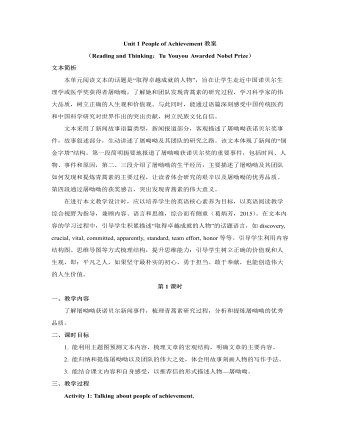
新人教版高中英语选修1Unit 1 People of Achievement教案
【设计意图】 基于上述分析,学生总结新闻故事语篇类型的特征,即标题的省略性、导语的概括性、数据的支撑性和引语的重要性。在此过程中,学生对新闻故事语篇类型有了更深层次的了解,对于学生阅读和写作具有重要意义。Activity 7: Discussing to make a writing outline.本活动为实现课时目标3。1.Discuss and make an outline.Ask students to discuss in groups of four and make their own writing outline.To celebrate the 70th anniversary of the People’s Republic of China, our school newspaper starts a new column about “People of Achievement”. You plan to write a news story about one of the winners of the Medal of the Republic in 2019, including Yu Min, Shen Jilan, Sun Jiadong, Li Yannian, Zhang Fuqing, Yuan Longping, Huang Xuhua and Tu Youyou.【设计意图】 教师创设情境,即为庆祝新中国成立70周年,校报新增有关卓有成就人物的栏目,你将从共和国勋章获得者中,选择一位写一篇新闻故事,向该栏目投稿。学生以小组合作形式,展开讨论,并写出新闻故事框架,有助于学生课后收集人物信息,撰写新闻故事。
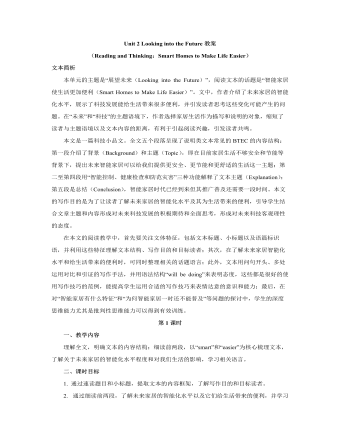
新人教版高中英语选修1Unit 2 Looking into the Future教案
【设计意图】以“新科技是一把双刃剑”为主题开展讨论活动。这个话题比较大,所以给了一定的限制,首先需要以智能家居为例来阐述科技发展对未来生活产生的影响,然后列举其优点和缺点,最后就以上现象发表自己的观点。这个活动是对整个文本的创意性总结与意义的升华,留给学生一定的想象空间,学生借此机会可以运用文本内容和语言表达自己对科技发展的看法和态度。Assignments:1. Finish Exercise 4 on Page 15 of the textbook.A smart home is one that integrated computers into the structure of the building itself. In this way, many of the things that we now do ourselves become automatic. For example, the smart home could control the air conditioning and lights so that you would no longer have to turn switches on and off, and so that your home would be more energy-efficient. The smart home could also monitor itself to make sure that everything is working as it should, and send you warnings if there is a problem. Such smart homes could even be programmed to detect your health problems, and then give you reasonable advice as to the food you should eat or if you should see a doctor. So, in a sense, smart homes will lead us to living smarter lives.2.Create a smart function for your home, and share your creation in the next period.
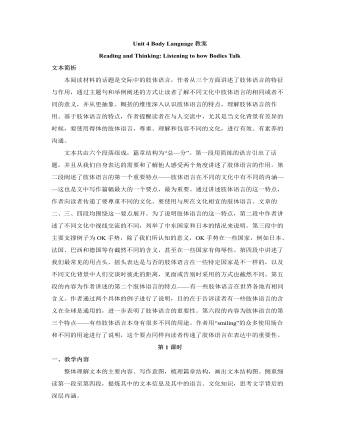
新人教版高中英语选修1Unit 4 Body Language教案
本阅读材料的话题是交际中的肢体语言,作者从三个方面讲述了肢体语言的特征与作用,通过主题句和举例阐述的方式让读者了解不同文化中肢体语言的相同或者不同的意义,并从更抽象、概括的维度深入认识肢体语言的特点,理解肢体语言的作用。基于肢体语言的特点,作者提醒读者在与人交流中,尤其是当文化背景有差异的时候,要使用得体的肢体语言,尊重、理解和包容不同的文化,进行有效、有素养的沟通。文本共由六个段落组成,篇章结构为“总—分”。第一段用简练的语言引出了话题,并且从我们自身表达的需要和了解他人感受两个角度讲述了肢体语言的作用。第二段阐述了肢体语言的第一个重要特点——肢体语言在不同的文化中有不同的内涵——这也是文中写作篇幅最大的一个要点,最为重要。通过讲述肢体语言的这一特点,作者向读者传递了要尊重不同的文化、要使用与所在文化相宜的肢体语言。
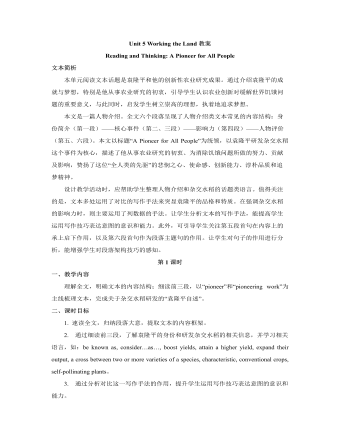
新人教版高中英语选修1Unit 5 Working the Land教案
1. 完成文本主要信息填空(斜体字部分设空):As a witness to farmers’ poor harvests and even a severe shortage of food, Yuan Longping was determined to devote his life to tackling this crisis. After graduation, he realized that what farmers needed most was to boost yields in the fields. Yuan was convinced that the answer lay in the creation of hybrid rice, one characteristic of which is that it usually achieve higher output than conventional crops. However, it was no easy job. The first difficulty he needed to overcome was scientists’ general assumption that this could not be done. Through trial and error, Yuan managed to generate this incredible crop. It is estimated that about 60 percent of domestic rice consumption in China was comprised of crops generated from Yuan’s hybrid strains. His innovation has enabled Chinese farmers to considerably expand their output and helped feed the world. Unwilling to retire early to a life of leisure and unconcerned about celebrity or fortune, Yuan continues to turn one vision after another into realities.2. 模仿写作:Do some research via the Internet and introduce another agricultural scientist, Chen Risheng(陈日胜), using the structure, expressions and writing techniques you have learnt from the text “A Pioneer for All People”.【设计意图】任务1是对文本内容和词汇学习成效的检测。任务2借助文本中学到的词汇和写作手法仿写另一位科学家,提升学生迁移运用词汇、文体结构和写作方法的能力。
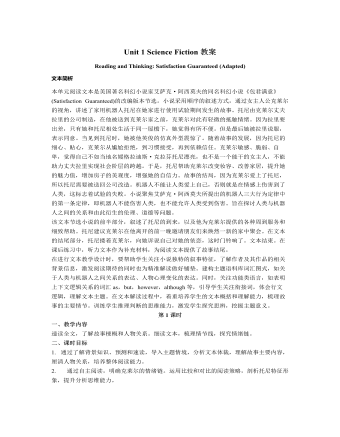
新人教版高中英语选修4Unit 1 Science Fiction教案
本活动旨在落实课时教学目标2。 1.Think, discuss and share. Students form groups of 4, discuss about the given ending make comments. Q1: Do you like the ending? Q2: Was it a logical ending? Why so or why not? [设计意图]通过引导学生思考、讨论、评价,比较个人、同伴所预测的结局和听力文本所给定的结局的异同点,深化对文本的认知,发展学生的评判性思维能力。 Activity 4: Exploring Asimov’s three laws of robotics and the purpose of the writing 本活动旨在落实课时教学目标3。 1. Get to know Isaac Asimov’s three laws of robotics. The teacher shares Isaac Asimov’s three laws of robotics. The three laws state that: ①A robot may not injure a human being or, through inaction, allow a human being to come to harm. ②A robot must obey any orders given to it by human beings, except where such orders would conflict with the First Law. ③A robot must protect its own existence as long as such protection does not conflict with the First or Second Law. Q: How does Tony’s story relate to the laws? 2. Figure out Isaac Asimov’s purpose of writing Satisfaction Guaranteed. The students express their opinions about the author’s writing purpose. Q: Why did Isaac Asimov write such a story? S: To explore the relationship between robots and humans. [设计意图]通过了解艾萨克·阿西莫夫所制定的机器人三大定律,加深学生对文本的理解,深入探究文本的主题意义。推理作者的写作目的,联系生活实际,思考人类与机器人的关系。
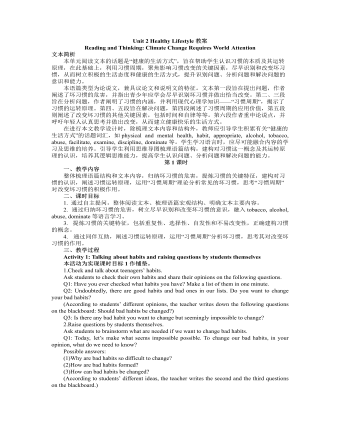
新人教版高中英语选修3Unit 2 Healthy Lifestyle教案
Activity 4: Figuring out the structure and the writing purpose 本活动为实现课时目标2。 1.Read Paragraph 6 and think about its main idea and the writer’s writing purpose. Q1: If you were the author, how would you end your article? “For young people, there is plenty of time to change bad habits. However, there is no “magic pill” or delete button that will help you; you have to think about your bad habits and decide on some changes. You have the power to build a happy and healthy life full of good habits!” Q2: What is Paragraph 6 mainly about? (Possible answer: to appeal to young people including teenagers to change bad habits and live a happy and healthy life.) 2.Think about the writer’s writing purpose and share opinions. Q1: What is the writing purpose? Work in pairs and figure it out. (Possible answer: On the one hand, the passage is written to help teenagers change their bad habits and live a healthy lifestyle. On the other hand, it provides us with a scientific way to identify and analyse our problems objectively, thus strengthening our resolve to tackle the seemingly common yet tough problems in our lives.) 【设计意图】 步骤1旨在预测和验证文章最后一段主要内容,梳理完整的语篇结构,步骤2旨在思考和讨论作者的写作目的。教师也可根据学生课堂反应情况融入对语篇人称多次转换的思考。
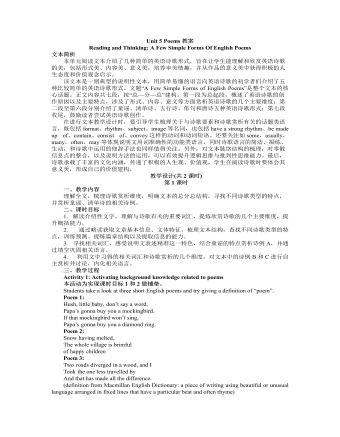
新人教版高中英语选修3Unit 5 Poems教案
本单元阅读文本介绍了几种简单的英语诗歌形式,旨在让学生能理解和欣赏英语诗歌的美,包括形式美、内容美、意义美,培养审美情趣,并从作品的意义美中获得积极的人生态度和价值观念启示。 该文本是一则典型的说明性文本,用简单易懂的语言向英语诗歌的初学者们介绍了五种比较简单的英语诗歌形式。文题“A Few Simple Forms of English Poems”是整个文本的核心话题。正文内容共七段,按“总—分—总”建构。第一段为总起段,概述了英语诗歌的创作原因以及主要特点,涉及了形式、内容、意义等方面赏析英语诗歌的几个主要维度;第二段至第六段分别介绍了童谣、清单诗、五行诗、俳句和唐诗五种英语诗歌形式;第七段收尾,鼓励读者尝试英语诗歌创作。 在进行文本教学设计时,要引导学生梳理关于与诗歌要素和诗歌赏析有关的话题类语言,既包括format、rhythm、subject、image等名词,也包括have a strong rhythm、be made up of、contain、consist of、convey这样的动词和动词短语。